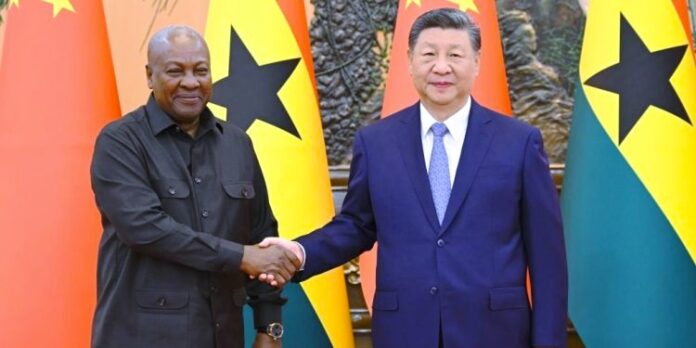Economist Professor Godfred Bokpin has argued that China stands to gain more from the zero-tariff trade agreement with Ghana than Ghana itself.
Speaking on JoyNews’ PM Express, Prof. Bokpin said the deal must be understood primarily from China’s perspective, not Ghana’s.
“China needed this more,” he said. “China wants to reduce its exposure to the US market and diversify. China has been doing this consistently.
“If you look at the expansion in terms of trade openness between China and Africa, you can see China is very strategic. They want to reduce their exposure to the US, and they need markets.”
He noted that even before the agreement, Chinese goods had already flooded the Ghanaian market. “Do you want it to get worse?” he asked. “Even with some level of tariffs, Chinese goods are all over the place.”
Prof. Bokpin criticised the government for failing to properly consult key stakeholders like the Association of Ghana Industries (AGI) and the Ghana National Chamber of Commerce before agreeing to the deal.
“They are the big players, the ones doing the numbers,” he said. “You needed broad-based consultation to understand how they see it.”
He explained that while the agreement may appear mutually beneficial, it largely serves China’s long-term economic strategy.
“This is just an aspect of a bigger picture that China has for Africa,” he said. “Recently, a team of experts from China visited Ghana to identify investable projects—part of a broader agenda.”
Responding to host Evans Mensah’s question about whether Ghana had a choice, Prof. Bokpin said, “We don’t have an option. China is quite powerful as a trading partner and a development partner.
“Given what we have seen in the last 20 years with Paris Club creditors and the rise of non-Paris Club creditors, we don’t have many options.”
He argued that Africa lacks a coherent strategy for global trade engagement.
“Have we sat down to develop a strategy? Does Africa have a strategy to engage the rest of the world?” he asked.
“Having the African Continental Free Trade Area doesn’t mean we are taking advantage of it. It’s like saying that because Africa has more slots in the World Cup, it will win. It depends on how you prepare your players, who are your industrial sector actors and investors.”
Prof. Bokpin pointed to deep structural weaknesses that make Ghana uncompetitive even with tariff protection.
“Our economic orientation is not designed to favour exports. Everything we are doing here is import-driven,” he said.
“Look at our financial system—it supports imports, not production. The portion of private sector credit that goes to agriculture and manufacturing is small compared to what goes to services that fund trade.”
Source: Abubakar Ibrahim
ALSO READ:


